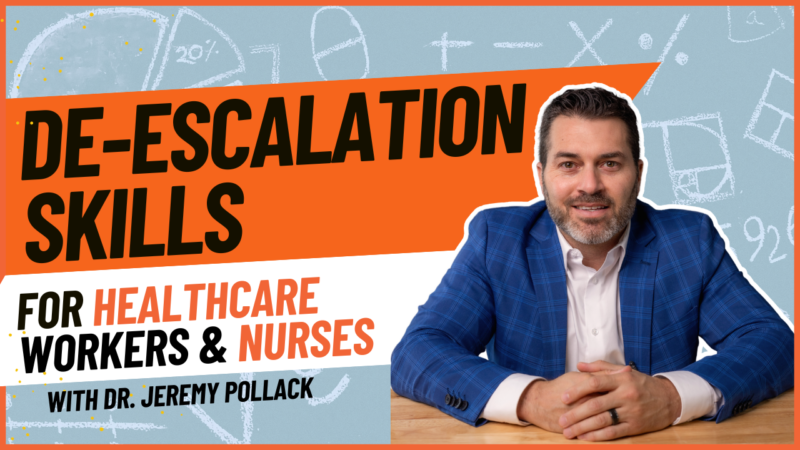Table of content
In healthcare settings, professionals are often at high risk of encountering violence. According to the World Health Organization (WHO), between 8% and 38% of healthcare workers experience physical violence at some point in their careers. Many more are exposed to verbal aggression, which significantly impacts their well-being and the quality of care provided.
With such alarming statistics, dealing with angry patients and their families becomes a critical skill for healthcare workers. As tensions rise in emotionally charged situations, proper de-escalation techniques are crucial for ensuring staff safety and patient care.
This blog will explore essential de-escalation tactics for healthcare professionals to effectively manage anger and aggression in medical environments.
Understanding Anger
Anger can arise swiftly in healthcare settings, often surprising patients and medical professionals. Addressing an angry patient starts with understanding the triggers and emotional states that fuel this powerful emotion.
Common Triggers for Patient Anger
Several common factors can contribute to escalating emotions, leading patients to their boiling point. These include:
- Receiving Bad News: When patients hear unexpected or negative health updates, their sense of control and hope can diminish rapidly.
- Long Wait Times: Waiting for treatment or test results can fuel frustration, especially in high-stress environments.
- Unclear Communication: When specific concerns about their care are overlooked, patients feel undervalued or ignored.
- Discomfort or Pain: Physical pain often aggravates emotional responses, as the patient’s tolerance for stress is reduced.
- Previous Negative Experiences: Past traumatic encounters in healthcare can trigger a patient’s defensiveness, especially if they feel vulnerable again.
The Psychological and Emotional Aspects of Anger
Anger often reflects a patient’s deeper emotional state. When patients feel frightened or helpless, anger becomes a way to mask these emotions and assert control. Understanding the root cause of their anger—whether it is fear, frustration, or uncertainty—helps healthcare workers engage with compassion and patience.
An angry patient may not just be responding to their immediate situation. Sometimes, the frustration has been building over time due to personal struggles, chronic conditions, or the anxiety that often accompanies hospital visits. Healthcare workers must look beyond the surface to understand the broader context.
Importance of De-Escalation
De-escalation plays a vital role in maintaining safety in healthcare environments. With workplace violence on the rise, healthcare workers must be equipped with the skills to manage intense situations involving patients and their families.
Why De-escalation Training Is Critical for Healthcare Workers
Healthcare professionals are five times more likely to face workplace violence than those in other industries, with incidents ranging from verbal threats to physical assaults. With such alarming statistics, it is clear that dealing with angry patients and preventing aggression from escalating is critical.
De-escalation techniques are essential for preventing immediate harm and also for avoiding long-term emotional and legal repercussions.
Immediate and Long-term Benefits of De-escalation Techniques
- Enhanced Patient Satisfaction: Patients who feel listened to and respected are more likely to leave healthcare settings with a positive experience. This boosts patient satisfaction, even in emotionally charged environments.
- Prevention of Worse Health Outcomes: Without de-escalation, stressful patient encounters can lead to aggressive behavior, which can delay treatment and result in worse health outcomes. By defusing tension early, the care can continue smoothly and effectively.
- Reduction in Staff Burnout: Dealing with aggressive or dissatisfied patients is mentally and emotionally draining. De-escalation techniques help reduce stress on healthcare workers, leading to better job satisfaction and lower turnover.
- Improved Communication and Compliance: When patients feel heard and understood, they are more likely to cooperate with medical advice, leading to better long-term positive outcomes for their health.
- Lower Risk of Legal Action and Security Incidents: De-escalation techniques reduce the likelihood of violent outbursts, which in turn lowers the risk of legal action and the need for costly security measures.
Techniques for Dealing with Angry Patients
Effectively dealing with angry patients requires a thoughtful approach that blends active listening, calm body language, and well-timed verbal interventions. Mastering the following de-escalation techniques helps healthcare providers manage patient anger, ensuring that interactions end on a positive note rather than escalating to administrative complaints or aggressive confrontations.

Active Listening and Empathy
The first step in defusing an upset patient is active listening, a technique that shows the patient they are being heard. When a patient is frustrated, their immediate need is often to voice their concerns. By carefully listening, paraphrasing their words, and making empathetic statements, healthcare providers can reduce the patient’s frustration and show they understand their emotional state.
Empathy goes a step further than listening—it involves connecting with the patient’s feelings, even if you cannot fix their problem immediately. Simple responses like, “I understand why you are upset, and I am here to help,” can go a long way in calming a patient.
Maintaining Calm Body Language
When emotions run high, body language can either escalate or de-escalate a situation. As a healthcare provider, maintaining open and non-threatening body posture is crucial. For example, standing or sitting with arms relaxed, maintaining eye contact, and nodding to show you are listening can help soothe angry patients.
Conversely, crossing your arms, raising your voice, or moving too close can provoke further anger. Keeping a safe distance and appearing calm and attentive will reassure the patient that you are in control and focused on resolving the issue.
Verbal De-escalation Tactics
Words are powerful tools when dealing with angry patients. Speak slowly and softly, acknowledging their frustrations without becoming defensive.
One key verbal strategy is to let the patient speak without interrupting, then respond with validation: “I see that this has been difficult for you.” Avoid phrases like “calm down,” which often worsen the situation. Instead, use reflective statements that mirror their concerns, followed by possible solutions.
For example, “What would you like to see happen now?” shows that you are actively trying to help without dismissing their anger.
Setting Boundaries Appropriately
In some cases, angry patients may resort to a verbal barrage or even threats. Here, it is essential to set limits while maintaining professionalism. Politely inform the patient that certain behaviors, such as shouting or insults, are unacceptable: “I am here to help, but we need to have a respectful conversation for me to assist you.” This statement calmly sets boundaries without escalating the situation.
If a patient becomes excessively aggressive, prioritize your own safety and involve additional support, such as a supervisor or security personnel.
Training Programs Offered by Defuse De-escalation Training
De-escalation is an essential skill in high-pressure environments, especially in healthcare settings where tensions can escalate rapidly. Defuse De-escalation Training offers comprehensive workshops tailored to different industries, including specialized programs for healthcare professionals.
Overview of De-escalation Workshops
We offer a wide range of de-escalation workshops that cater to various industries, equipping professionals with essential skills to handle conflicts and prevent aggressive behavior. Available both in-person and online, these workshops help organizations create safer, more productive environments by teaching participants how to recognize and respond to escalating situations.
Some of the workshops provided by Defuse include:
- Asynchronous Training: Flexible, self-paced online learning for professionals who need to integrate training into busy schedules.
- Customer Service: Focuses on excellence in handling customer interactions and de-escalating tense situations.
- Hotel Staff: Teaches hospitality skills and how to manage conflicts with guests calmly and efficiently.
- Healthcare Workers: This program is tailored to those who deal with an angry patient or emotionally distressed relative, ensuring the safety and well-being of both staff and patients.
- Mental Health Professionals: Covers techniques for managing patient conflict and providing a compassionate response in challenging scenarios.
- Retail Staff: Helps employees prevent anger from escalating in customer interactions, maintaining a calm shopping environment.
Training for Healthcare Professionals
Healthcare workers, especially those on the front lines, often deal with emotionally charged situations. De-escalation techniques are critical, whether handling an angry patient or calming a distressed relative.
Our training for healthcare professionals focuses on key strategies such as active listening, body language, and verbal communication. By learning these skills, healthcare workers can identify early signs of aggressive behavior and take steps to prevent it before it escalates into violence. This training enhances workplace safety and also improves patient satisfaction by fostering better communication and empathy.
Specialized Techniques for Nurses
Nurses, in particular, are often the first point of contact for patients and are, therefore, more likely to face an angry patient. Defuse’s specialized training on de-escalation for nurses covers techniques tailored to their unique responsibilities, including managing a patient’s anger and ensuring the safety of both staff and patients.
This training also addresses specific situations nurses might face, such as dealing with non-compliant patients or resolving conflicts related to a treatment plan. By employing these de-escalation techniques, nurses can defuse potential conflicts early on, promoting a more positive and cooperative environment.
Through these training programs, Defuse equips healthcare workers with the tools they need to prevent anger from escalating, ensure a positive note at the end of patient interactions, and reduce the likelihood of administrative complaints or workplace incidents.
How to Implement Learnings in Real Situations
De-escalation training equips healthcare professionals with valuable skills, but the real challenge lies in implementing these techniques effectively in high-pressure situations. Practice and preparation are key to successfully applying de-escalation strategies in real-world scenarios.
Practice Scenarios and Role-Playing Exercises
One of the most effective ways to internalize de-escalation techniques is through practice scenarios and role-playing exercises. Here are some practice scenarios and role-playing exercises that healthcare professionals can use to strengthen their de-escalation skills:
- Handling an Angry Patient Due to Long Wait Times: In this role-play, a patient who has been waiting too long for a scheduled procedure becomes agitated. The healthcare worker must recognize the early signs of the patient’s anger, such as pacing or raised voice, and intervene calmly. The goal is to acknowledge the patient’s frustration, explain the reason for the delay, and offer a solution or alternative while maintaining control of the situation. The healthcare worker can practice staying composed and using active listening to reassure the patient and prevent further escalation.
- Breaking Bad News About a Medical Error: This scenario involves delivering difficult news regarding a medical error made during treatment. The healthcare worker must deliver the news with empathy, apologize without becoming defensive, and offer solutions or next steps. In the role-play, the worker practices how to remain calm and composed, using open body language and acknowledging the patient’s distress. The goal is to de-escalate the patient’s anger while maintaining professionalism.
- Dealing with a Verbally Aggressive Patient: In this exercise, a patient begins a verbal barrage against a nurse, accusing the healthcare team of incompetence. The role-play allows the healthcare worker to practice techniques like active listening, staying calm, and responding in a measured way. The worker can rehearse setting boundaries by informing the patient that disrespectful behavior will not resolve the issue but that the healthcare team is there to help. The focus is on de-escalating the conversation while ensuring the healthcare professional’s safety.
- Calming a Patient’s Family Member Who Is Upset Over Treatment Plans: This scenario involves a healthcare worker who is upset about a treatment plan a family member does not agree with. The worker practices calming the family member, explaining the reasoning behind the plan, and addressing their concerns without letting the conversation become confrontational. The worker can focus on maintaining empathy and ensuring that the family member feels heard and understood.
Developing Personalized Action Plans
While practice scenarios help train workers, each angry patient and conflict is unique. This is where personalized action plans come into play. After role-playing, healthcare workers should develop individualized strategies for managing difficult situations, considering the specific challenges of their work environment.
For instance, in high-stress areas like the emergency department, healthcare workers may develop action plans that include clear steps for managing medical errors and communicating effectively to prevent further escalation. These plans might detail how to deliver bad news while remaining empathetic and composed or how to calm other patients in the room during a tense interaction with a distressed individual.
Healthcare workers can also create strategies for managing their own stress in conflict situations. Understanding how to regulate emotions can prevent an overreaction when dealing with angry patients. These action plans often focus on de-escalating internal reactions, allowing workers to stay calm and in control.
Take Control of Challenging Patient Interactions
De-escalation training is critical for healthcare professionals who frequently face intense situations. Whether it’s dealing with angry patients or addressing heightened emotions from relatives, mastering de-escalation techniques ensures that healthcare workers can effectively calm and resolve conflicts. These skills enhance safety and also help staff manage patient anger in a way that fosters trust and improves patient outcomes.
At Defuse, we offer specialized training to help healthcare professionals gain confidence in defusing tense situations. Our programs equip you with practical tools to prevent conflicts from escalating. If you’re ready to enhance your de-escalation skills, contact us today to explore how we can support you and your team in creating a safer, more compassionate healthcare environment.




